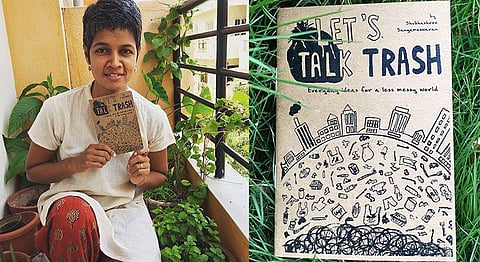Let This Illustrated Zine Be Your Guide To Living A Zero Waste Life
From clothing brands and grocery stores to our very own sustainability warriors who’ve adopted environment-friendly lifestyles that result in little-to-no waste generation, the ‘zero waste’ lifestyle seems to have finally found an audience among India’s urban populace. But what might seem like a trend originating from the West actually has roots much closer to home.
I didn’t grow up in the 80s but just like Shubhashree Sangameswaran, the author of an illustrated book called ‘Let’s Talk Trash’, I too have memories of tagging along with my grandfather every evening at 6 pm as he stepped out, with the same old tin container in his hand, for his daily milk run to a nearby cowshed. “In the West, I saw that there was a rise in the type of stores where you could take your own jars and containers to buy grocery staples. And that’s when a lightbulb went off in my head saying, ‘Hold on, this is exactly what our older generations used to do’”, she tells us. And indeed, she was right.
Like many, Shubhashree’s first conscious encounter with the concept was when she came across an American woman’s blog about living the zero waste lifestyle. There was a certain enchantment in the way Lauren Singer held up a small jam jar and proudly declared that this was all the waste she had generated in the last two years. “So I began to read up more on the lifestyle until eventually, I realised that in India we used to do it all the time – taking our own cans to buy milk, our own bottles to buy oil. Also, my dad used to go once every few months to the wholesale market and get big bags of rice and other staples so there was not too much packaging used and wasted.” And that’s when the idea for Let’s Talk Trash came to her.
Let’s Talk Trash is a self-published, illustrated handbook which talks about the simple ways in which both children and adults can reduce the trash they generate at home. It is a neatly illustrated copy that starts off with a throwback to the 80s when cassette tapes and dial-up internet still existed. From reusing the countless Horlicks and Bournvita boxes in the kitchen to purchasing large quantities of rice and other staples and storing them in huge bins with dried neem leaves to keep the bugs away, this book introduces the zero waste concept sans the usual pretentiousness.
“The right opportunity came when I signed up for The Sketchbook Project — a global art project which puts up sketchbooks from all around the world on display at The Brooklyn Arts Library. I chose this as my theme, filled up my sketchbook, sent it out, and then posted pictures of it on my Instagram. The response was great, people wanted to know where they could buy copies. Last month, I decided to put up a zero waste version of the book as well and published a Kindle version too”, says the Hyderabad-based illustrator who worked in IT for almost a decade before moving back to India and pursuing her creative passion.
However, it’s ironic that a country which seems to have historically been zero-waste in many ways is today responsible for creating 62 million tonnes of waste every year. Somehow, with our landfills creating greenhouse gas emissions and our villages affected by the toxic fumes of burning garbage, we’ve given in to this age of excess without thinking twice about where we might be headed. “We’re overworked, we binge-watch, we binge-drink, and we binge-spend. We’re always looking for convenience over everything else because we can now afford to spend money on something if it makes our lives easier”, adds Shubhashree.
With Let’s Talk Trash, Shubhashree hopes that she can recreate the awareness that has already existed within the knowledge of our households for years. Moreover, she wants to get it translated and take it to schools across the country and conduct workshops so that children, from an early age, can inculcate environment-friendly and zero-waste habits in their lives.
You can visit Shubhashree’s website to purchase a copy of Let’s Talk Trash.
If you enjoyed this article, we suggest you read:


